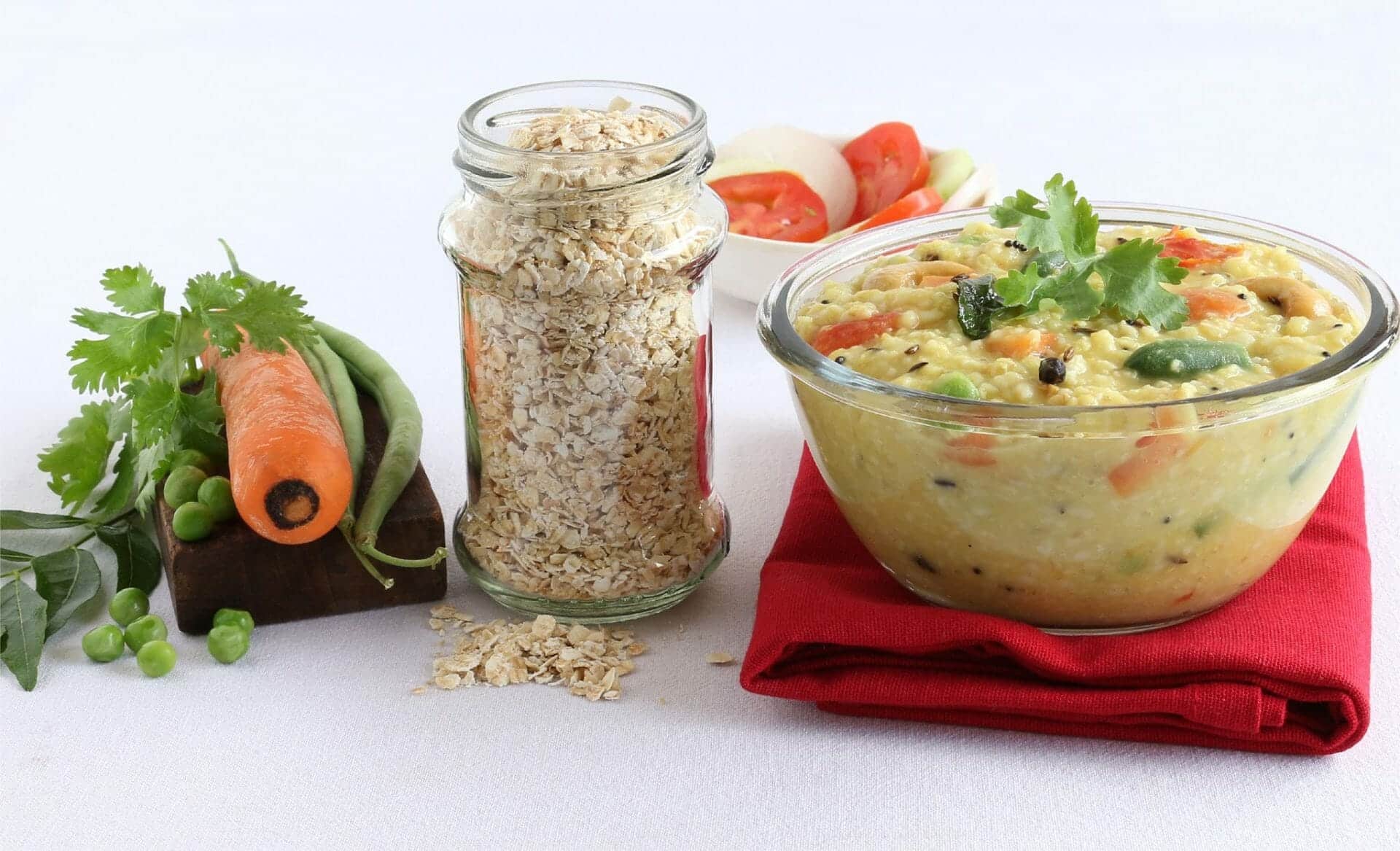
Cholesterol is crucial to our body’s cell membranes and serves various essential functions. However, not all cholesterol is created equal. High amounts of low-density lipoprotein (LDL) cholesterol, often called “bad” cholesterol, can lead to plaque accumulation in the arteries, amplifying the risk of heart disease. On the other hand, high-density lipoprotein (HDL) cholesterol, known as “good” cholesterol, helps remove excess LDL cholesterol from the bloodstream, reducing the risk of heart disease. Reduced HDL cholesterol levels are a notable predictor of atherosclerotic cardiovascular events. HDL is thought to protect against atherosclerosis by facilitating reverse cholesterol transport. It may benefit through its anti-inflammatory, anti-oxidative, antithrombotic, and nitric oxide-related mechanisms. [16]
In Ayurveda, nutrition, known as “Aahara,” stands as one of the foundational pillars of existence (Upasthambhas). Aahara plays a vital role in supporting essential aspects of life, including Varna, Bala, and Upachaya. The quantity of Aahara one should consume is contingent upon one individual Agni (digestive fire) and the specific type of food they choose. The various components of good cholesterol foods, characterized by their unique flavors, qualities, potencies, and digestive transformations, are responsible for maintaining the equilibrium of Dosha and Dhatu. [18]
This article will tell you about 15 of the best foods rich in good cholesterol that can help promote heart health.
What foods are good for cholesterol?
- Fatty Fish
Fatty fish like salmon, hilsa, sardines, and trout have high amounts of the healthy omega-3 fatty acids and are great sources of good cholesterol foods. They have been recommended for their potential to elevate HDL-C levels, primarily attributed to the surface enrichment of n-3 polyunsaturated fatty acids (PUFAs), thus bolstering the process of reverse cholesterol transport. [1]
- Oats
Oats are an amazing source of soluble fiber, which can help increase HDL or good cholesterol levels. Soluble fiber in Oats works by reducing the absorption of LDL cholesterol into the bloodstream, improving blood lipid profiles, and aiding in maintaining body weight, making them good cholesterol foods. [2]
- Nuts
Nuts such as cashews and other nuts are packed with heart-healthy monounsaturated fats, which can raise HDL cholesterol levels. They also provide fiber, antioxidants, and essential nutrients. A handful of nuts offer substantial energy content, approximately 596 kcal per 100 grams, and are a rich source of vital fatty acids like linoleic and oleic acids. These vital fatty acids play a pivotal role in reducing free radicals and contributing to managing cardiovascular diseases and are thus good cholesterol foods. [3]
- Olive Oil
Oleic acid plays a role of immense importance in the metabolism of cholesterol circulating through lipoprotein. It contributes to a reduction in LDL-cholesterol levels and concurrently promotes an increase in HDL-cholesterol. This dual effect of these good cholesterol foods lowers the risk of atherogenesis and plaque buildup in arteries. [4]
- Avocado
Among the other foods that increase good cholesterol are avocados, which contain micronutrients that hold potential benefits for blood pressure. Studies involving avocado consumption have demonstrated positive effects, including reducing LDL cholesterol and increasing HDL cholesterol levels in individuals with high cholesterol. [5]
- Beans and Legumes
Next on the good cholesterol foods list are beans, pulses and legumes, such as lentils, chickpeas, and black beans, which are high in soluble fiber and plant-based protein. Consuming these foods can help lower LDL cholesterol and increase HDL cholesterol. [6] Numerous legumes exhibit Kaphamedohara properties associated with balancing the Kapha Dosha, making them advisable Pathya for individuals with cardiovascular conditions. [17]
- Whole Grains
Whole grains like rajma, brown rice, quinoa, and whole wheat bread contain fiber, which are good cholesterol foods. They also provide essential nutrients that support overall heart health, such as dietary fiber, resistant starch, tocols, mono-and polyunsaturated fats, plant sterols, and isoflavones. [7]
- Fruits Rich in Pectin
Certain fruits like apples, pears, and citrus fruits are high in pectin, a type of soluble fiber that can raise HDL cholesterol levels and are thus considered good cholesterol foods. They facilitate the absorption of cholesterol, lipids, and vitamins soluble in intestinal fat. [8] Fruits like Amla help balance the tridoshas and also strengthen the heart. [22]
- Berries
Berries, including the succulent varieties like strawberries, blueberries, and raspberries, are packed with polyphenols, especially anthocyanins, micronutrients, and fiber. These compounds can contribute to higher HDL cholesterol levels and lower the chances of fatal heart diseases and hence are good cholesterol foods. [9]
- Dark Chocolate

Dark chocolate, in moderation, can be a heart-healthy treat. It contains cocoa rich in polyphenols that can increase the concentration of HDL cholesterol levels and improve blood vessel function. [10]
- Green Tea
Green tea is a storehouse of antioxidants called catechins, which may help boost HDL cholesterol levels and lower LDL cholesterol levels significantly. [11] This herbal infusion can be termed “Amapachak herbal tea.” Amapachak herbal tea is a fusion of diverse Ayurvedic herbal remedies designed to promote detoxification and purification of the body. These assorted remedies can be categorized based on an individual’s Prakriti or inherent constitution, which falls into three primary types determined by the predominant Dosha. [20]
- Fiber-Rich Vegetables
Vegetables like broccoli, Brussels sprouts, and okra are high in soluble fiber, which can enhance good cholesterol levels. [12] Others like Soorana and Methi have Katu, Ushna, and Ruksha Guna and are Vata Kapha Shamakas. [21]
- Garlic
Garlic bulb extracts have been used for its medicinal properties for centuries. It contains allicin, a compound that positively impacts cholesterol levels, including a significant reduction in some lipid profile parameters, especially TG, and an increase in HDL. [13] The buildup of imbalanced Meda and Kapha within the blood vessel walls is effectively addressed by including garlic (rasona) in the diet. [19]
- Soy
Soy products like tofu/soy paneer and soy milk contain plant compounds called phytosterols, soy proteins, and saponins that possess an amphiphilic nature, forming insoluble complexes. These complexes act to inhibit the absorption of LDL cholesterol within the intestine and increase HDL. [14]
- Flaxseeds
Intake of flaxseeds, high in fiber, has been linked with HDL cholesterol levels and reduced risk of heart disease. [15]
FAQs
• What are some excellent foods to reduce cholesterol?
Diversify your dietary choices by incorporating a wide array of wholesome foods such as fruits, vegetables, whole grains, nuts, legumes, lean meats, and fish. [23]
• Is it important to lose weight to help keep cholesterol levels in check?
Excess body weight is associated with high bad cholesterol levels and an increased possibility of heart disease. Shedding those extra pounds can effectively reduce LDL cholesterol and triglyceride levels, promoting heart health. [23]
• How much physical activity should one do to maintain a healthy heart?
Engaging in consistent physical activity can contribute to reducing LDL cholesterol and elevating HDL cholesterol levels. Adults are encouraged to target at least 30 minutes of daily exercise, while children and adolescents must engage in at least 1 hour of physical activity/exercise each day. [23]
Conclusion
Increasing your HDL cholesterol levels can be crucial in maintaining sound heart health and reducing the risk of cardiovascular disease. Incorporating these 15 foods good for high cholesterol into your diet can promote good cholesterol levels and overall well-being.
Disclaimer:
This article has no relevance to Ayurveda and does not include medical advice. Certain lifestyle choices have been mentioned here but just for knowledge gathering purposes. Before you adopt any of these lifestyle or dietary measures, you must consult an expert.
References:
- Omega-3 Fatty Acids and HDL. How Do They Work in the Prevention of Cardiovascular Disease?
- Oats : Understanding the Science
- Cashew Nut Consumption Increases HDL Cholesterol and Reduces Systolic Blood Pressure in Asian Indians with Type 2 Diabetes: A 12-Week Randomized Controlled Trial
- Olive and Sesame Oil Effect on Lipid Profile in Hypercholesterolemic Patients, Which Better?
- Avocado consumption and risk factors for heart disease: A systematic review and meta-analysis



















